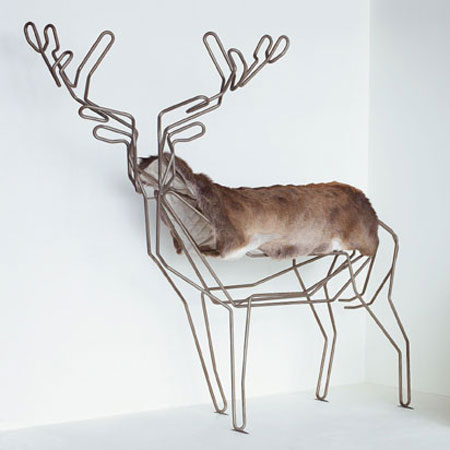Dutch designer Guus Van Leeuwen presented animal-shaped radiators at the Design Academy Eindhoven graduation show as part of Dutch Design Week last month.
Each radiator is covered with a removable, wheat-filled animal skin that absorbs and stores heat, and can be used for warmth elsewhere in the house.
See more from the Design Academy graduation show in our previous story.
The following is from Guus Van Leeuwen:
--
“Domestic Animals” is a series of radiators shaped like animals.
In earlier days people were very conscious of heating. Throughout the whole year they were busy to be able to put now and then some wood on the fire that was heating one room in the house during the winter. This one room was therefore a gathering place for the whole family. But over the last fifty years the effort that we take to heat the house is almost reduced to zero - at least in the western countries.
Besides the programming of electronic thermostat we don’t have to worry about the heating system that’s heating our whole house, wherefore the living room is losing its role as gathering place. Radiators are being hidden against the wall and they are by far not as pleasant to be near as the hearth was in earlier days. And all of this in a time we have to be very conscious in the way we are using energy.
“Domestic Animals” is referring to the time farmers used to live with or above their livestock to take advantage of their warmth. “Domestic Animals” is giving more attention to heating. The “Domestic Animals” are covered with the skin of the animal they represent, which is giving them a attraction to get near and touch them, so you can warm yourself up on them. And if you want to be somewhere else in the house you can take the skins with you to comfort yourself.
The skins are filled with wheat seeds which capture warmth and stay warm for a long period of time. In this way you don’t have to put the thermostat higher when you have it a bit chilly, and still can get it comfortable. And besides this all are the “Domestic Animals” beautiful objects that can enrich your living room.
Every “Domestic Animal” Consists out of one ongoing steel tube that starts and ends at the tail. This can’t be bended in one time, so every animal is build from 40 to 60 pieces, which are all bent by a computer-controlled machine. And after that I had to weld all these pieces onto each other to create this one ongoing tube. At the tail the radiators can easily be connected to the central heating system.

